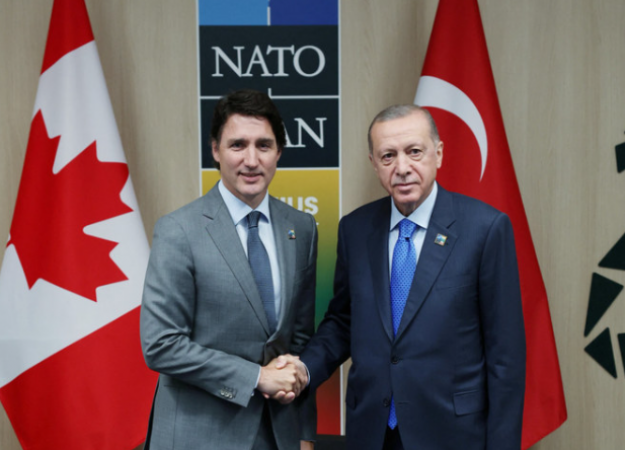
Ankara: After Ankara approved Sweden's application to join NATO, Canada unfroze discussions with Turkey about lifting export restrictions on drone parts, according to a person with knowledge of the negotiations. This is one of several concessions Canada made in exchange for Turkey's approval.
Even his domestic allies, who had backed him in demanding Stockholm take action against organisations deemed terrorist by Ankara, were taken aback by President Tayyip Erdogan's approval, which put an end to more than a year of opposition to Sweden's membership bid.
The United States quickly announced that it would proceed with a transfer of F-16 fighter jets after consulting with Congress in response to Erdogan's decision, which was made public ahead of a North Atlantic Treaty Organisation summit in Vilnius.
Also Read: France to Agree on UPI System with India to Reach Global Market
NATO member Canada agreed to reopen discussions on lifting export restrictions on drone parts, including optical equipment, in a potentially significant development for Turkey's defence industry, according to a person with knowledge of the discussions who declined to be named because they were not authorised to share specifics with the media.
After determining that the equipment had been used by Azerbaijani forces fighting Armenia in the enclave of Nagorno-Karabakh, Canada suspended the export of some drone technology to Turkiye in 2020.
According to the person familiar with the discussions, Turkiye requested that Canada's export controls be included in the final discussion as it was already seeking assurances regarding the F-16s in discussions with Washington prior to the NATO summit.
Turkiye wanted "a package deal," the source claimed.
As long as Turkiye promised to ratify Sweden's NATO membership application at Vilnius, the person said, Canada agreed to resume talks on the issue that had been put on hold after Turkiye initially objected to both Sweden's and Finland's membership applications last year.
Canada presented Turkiye with its stance on the rules governing the uses of any exported technologies at Vilnius and was awaiting a response. This means that the export control discussions are no longer on hold, which, according to the source, helped to seal Erdogan's commitment to Sweden.
Also Read: FTC Drops Bombshell: Halts Microsoft's Mega Acquisition of Activision
In response, a spokesman for Canadian Foreign Minister Melanie Joly stated that although export controls for Turkiye were still in effect, Canada and Turkiye "continue to engage in frank exchanges on our bilateral, economic, and commercial relations."
A representative of the Turkish defence ministry responded that it was unacceptable for NATO allies to impose export restrictions on one another and that "some progress has been made at the Vilnius Summit on that issue" when asked whether Turkey was in discussions with Canada to lift export restrictions.”
The official added, "But we will follow the outcomes of the negotiations and decisions made at the Vilnius summit.
Erdogan stated that Turkey expects all NATO allies to lift the sanctions and limitations on its defence industry in an interview with Turkish media that was released on Thursday.
After meeting with US President Joe Biden the previous day, Erdogan said on Wednesday that he was "more hopeful than ever" about the sale of the F-16 fighter jets. In October 2021, Turkiye asked for $20 billion worth of F-16 fighter jets and nearly 80 modernization kits for its existing warplanes.
After Russia invaded Ukraine, Ankara's objections have posed a significant barrier to Sweden and Finland joining NATO. A tougher stance against the Kurdistan Workers Party (PKK), which started using weapons against the Turkish government in 1984, was one of Turkiye's demands. Turkiye, the US, and the EU have all designated the PKK as a terrorist organisation.
In March, Finland's membership was approved by Turkey's parliament after Erdogan claimed Helsinki had taken significant action to stifle perceived terrorist organisations and to open up the defence export market.
Erdogan stated on Wednesday that he would submit Sweden's ratification to the legislature when it reconvenes in October and that Stockholm would give Turkey a timeline for the actions to be taken prior to the approval.
On Tuesday, the head of the Nationalist Movement Party (MHP), which Erdogan's AK Party depends on for its parliamentary majority, claimed that Sweden had failed to distance itself from terrorism, but he also said that Erdogan would make the final decision regarding Sweden's membership application.
Also Read: PM Modi Becomes First Indian PM to Receive France's Highest Civilian Award
Devlet Bahceli, the head of the MHP, and Erdogan met on Thursday.
Erdogan has also stated that before Turkey starts "work on implementing the promises (it) has made," he expects the EU to take action, including on modernising a customs union and enabling visa-free travel.
Erdogan "may have maximised how much he could get from holding up Sweden," a European diplomat claimed.
"We've seen in the past that he likes to use his levers."